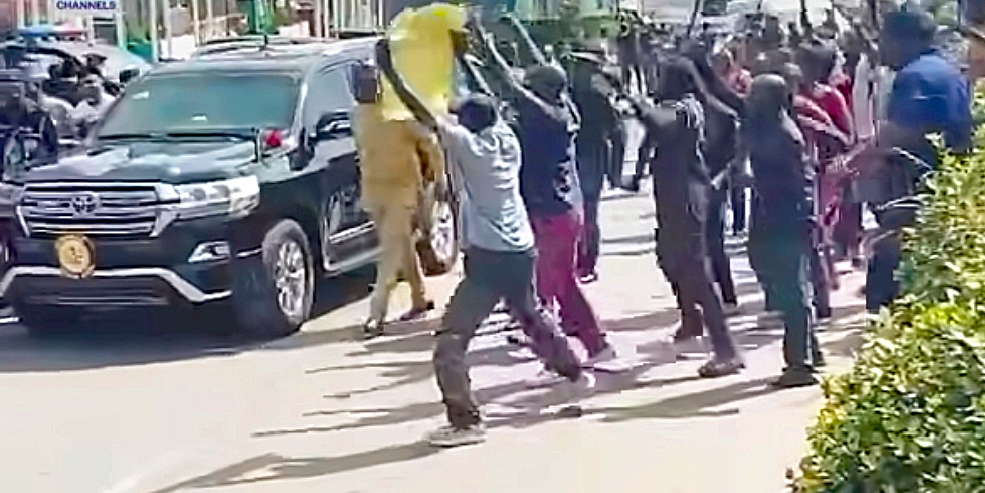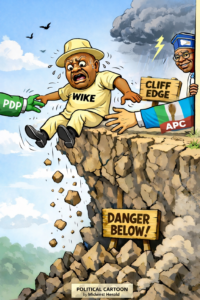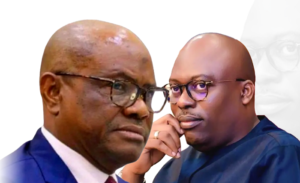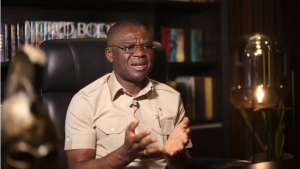Inside The PDP Power Wars—Fueling Nigeria’s Worsening Insecurity

A PDP Governor with mobilized thugs at the party's national secretariat in Abuja
By Danjuma Aanemhe
Nigeria’s insecurity crisis is often framed as a policing failure, but a recent investigation across six states reveals a more complicated truth—the political implosion inside the Peoples Democratic Party (PDP) is weakening institutional authority, disrupting local security structures, and empowering criminal networks who depends on handouts in vulnerable communities across the country.
At the centre of the storm are powerful political actors—Nyesom Wike, the Minister of Federal Capital Territory; Dan Orbih, the Vice Chairman South-Sounth; Seyi Makinde, Oyo State Chairman; Bala Mohammed, Bauchi State Governor; Senator Anyanwu, factional secretary and Umar Damagum (acting national chairman). Bature, the notorious PDP organising secretary is also in the rival blocs fighting for the soul of the party’s national leadership.
Their battles—fought in convention halls, state chapters, courts, and through proxy mobilisers—are reshaping political loyalties at the grassroots in ways that security agencies say are “dangerous and destabilising security architecture.”
The Battle for National Chairman between Umar Damagum versus Reformists/ Regional Power Blocs has exacerbated the illogical-self-interest political fight.
The PDP’s inability to resolve who should be the substantive national chairman has been one of the biggest drivers of chaos inside the party, which has left Damagum as a Chairman without any mandate.
Damagum has held the seat far longer than originally intended. His extended tenure—fiercely opposed by several southern blocs—has created paralysis inside the party. He is seen as lacking authority, beholden to certain northern governors, and unable to enforce discipline within warring state chapters. The result is that state chapters operate like independent republics.
Also, factions openly defy the national leadership. Local political leaders ignore Abuja’s directives and in the process, thugs are encouraged to enforce their directives—like the the shameful rival contestation in Rivers State between Wike and Governor Siminalayi Fubara.
Loyalists were armed to defend their position at the detriment of community peace.
A police intelligence officer in Abuja last week to this reporter that: “When the national chairman lacks legitimacy, nobody obeys him. That’s exactly what criminals exploit—disorganised political authority.”
Senator Samuel Anyanwu political crisis in Imo State has allegedly also contributed to security fallout in the state. The former PDP National Secretary and Imo State governorship candidate is accused of being at the centre of a high-stakes struggle between the national leadership and South-East blocs.
His alleged insistence on maintaining control of Imo PDP structures—even while serving at the national level—sparked parallel caretaker committees, rival youth wings, public protests, and factional struggles that has spilled into local government areas.
Security agencies say alleged that, political factions indirectly empowered cult groups, political thugs, and criminal youth gangs who were courted during heated primaries and later abandoned.
A senior officer in the Imo Security Council told this reporter that: “Political youths that were mobilised for the primaries but not disarmed have contributed to the security crisis in the state.”
In the North-West, PDP National Organising Secretary Umar Bature has emerged as a quiet but influential figure. He controls critical administrative levers. He has leveraged on his roles in Wadada Plaza to issue congress guidelines, nomination procedures, disciplinary directives, and approval of ward and local government area structures.
This has given him enormous behind-the-scenes power, which he has used to secure loyalists in strategically in his region.
Security officials in Zamfara, Kebbi, and Kaduna say the disunity created by competing PDP backed thugs has led to duplicated ward executives, rival vigilante groups who are claiming ‘party loyalty,’ and in turn, interfer in local security committees. This, the source said has weakened community policing.
A district head in Zamfara said: “Once two PDP factions emerge, each recruits its own boys. These boys later become bandit informants or extortion agents.”
The contest over who is the legitimate national secretary has been one of the most destabilising conflicts in the PDP.
The position earlier vacated by Senator Anyanwu—has become a tug-of-war involving South-East caucus, National Working Committee (NWC), court-backed claimants, and PDP governors from multiple zones.
These battles have fueled legal uncertainty over who can sign party documents, confused directives to state chapters, and factional youth mobilisation during ward congresses that often turns into sponsored violence.
Some PDP leaders who spoke to this reporter on Abuja during the invasion of the national secretariat admitted that the secretaryship battle has led to “ungoverned” political spaces in some states—spaces criminal groups quickly infiltrate.
Several key stakeholders, including Wike, Orbih, Makinde, Bala Mohammed and others, have deepened the party’s national and local fractures.
Nyesom Wike for instance is credited with the catalyst of the post-2023 implosion. Wike’s influence, especially through the G-5, splintered the party’s southern coordination networks. His standoff with Atiku Abubakar created two parallel national blocs whose loyalists competed for influence in different state security committees.
In Edo State, Dan Orbih’s long-running conflict with the former Edo State governor Godwin Obaseki’s camp crippled the state’s community security architecture at a time, when the youth wings of pro-Obaseki and pro-Orbih created openings that security experts believed were exploited by kidnapping syndicates, cult groups, and armed robbers.
Seyi Makinde has been described as a ‘Power Broker’ whose choices buried the PDP in South-West.
Makinde’s alignment with Wike at a time, reshaped the PDP map in the region, causing weakened inter-state security collaboration, and fragmentation of border community intelligence networks.
Governor Bala Mohammed political choices destabilized the Northern Nigeria Power Shift and believed to have contributed to breakdown of ‘Rural Peace Networks’.
Pointedly, Bala Mohammed’s clashes with certain northern caucuses fractured traditional conflict-resolution networks across Bauchi and neighbouring states.
Without these political elders mediating disputes, local tensions have escalated into farmer–herder clashes, youth militia recruitment, rural ambushes.
Investigations show how the PDP crisis is directly fueling insecurity in Nigeria through factional politicians using armed youths; political actors, gangs, who they recruit during internal contests; who later migrates into kidnapping, cultism, and bandit informant.
In several PDP controlled states security votes are diverted to prosecute political battles and has led to paralysis of the security architecture.
Like in Rivers State, political rivalry has led to the refusal of the State Assembly to pass budgets which stops local security funding, rural patrol budgets, vigilante stipends and ultimately results to collapse of Community Intelligence Networks.
This collapse has been reported to be the singular reason for the emergence of Boko Haram who claimed they were recruited by certain political actors to secure electoral victory by any means possible.
The PDP’s implosion—driven by Wike, Makinde, Bala Mohammed, Senator Anyanwu, Bature, Damagum, and others, due to unresolved battle for national chairman and secretary—has deepened political fragmentation across Nigeria and the party’s crisis is turning into a national security crisis.
Criminal groups—from rural bandits to urban cultists—are stepping into these holes.
Unless the PDP resolves its leadership war and rebuilds trust across its structures, its internal chaos will continue to spill into Nigeria’s fragile security environment.
As if the party has not destabilize Nigeria enough, the the gladiators took to the streets this week to wreck the peace of Abuja—with their ‘separatist’ security personnel who constituted themselves to public enemies tear gassed innocent Nigerians.








